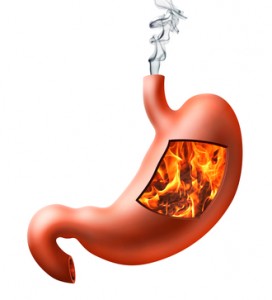 Some of the first red flags I had from my older son were his failure to eat solid foods, his projectile vomiting any food or breast milk he did eat, and, later, his failure to thrive.
Some of the first red flags I had from my older son were his failure to eat solid foods, his projectile vomiting any food or breast milk he did eat, and, later, his failure to thrive.
It was so sad to watch my baby dwindle from being born at the 40th percentile for weight down to the 3rd percentile at the age of 18 months.
He crossed three percentile curves on the way down; crossing two of them constitutes “failure to thrive”, but he also fit that definition by dropping below the 5th percentile curve. 
Where Were the Doctors?
Where were his doctors in all this? Again and again, different doctors told me, “He’s fine” and “There’s nothing to worry about”.
They said this even when I told them that he would throw up after almost every meal and even though his weight percentile was declining. They told me that because his height percentile was growing (for a few months) that there was nothing to worry about. They were wrong.
But I knew this wasn’t right. He had been projectile vomiting since he was a newborn. The doctors told me this was normal, that he was just a fussy baby with colic.
It became extremely hard for me to feed him solid foods later on when I introduced them when he was 5 months old.
It would take a good, solid hour just to get a few Cheerios and Yo-baby yogurt in him. Then he would turn right around and throw it up.
I did anything I could to distract him to get some food in him: sing, dance, have him play with toys and objects, turn on the TV or radio.
None of these really worked, but I was desperate. Many times he would outright refuse to eat, but then he would be starved for his next meal. Other times he would eat some, but then he would wake up screaming and/or wake up vomiting.
I was told by the doctor to limit the milk to 20-24 oz. per day in hopes that this would encourage him to eat more solid food. That didn’t work. He just ate less and cried even more, probably because his blood sugar was always tanked and he was starved.
I was told by the doctor that his feeding strike may be because his teeth were coming in. His teeth came in, and many times after that, he still refused to eat.
I was told by the doctor to give my son gas drops, Orajel and Tylenol because maybe he was gassy and maybe his teeth and gums hurt. This didn’t work.
The older he got, the longer his naps got. I suppose that because he wasn’t getting enough calories to remain active, it was easier for his body to just rest when he could, although many times he couldn’t rest because he would wake up cranky and/or vomiting.
I even made a spreadsheet (I used to be an analyst).
I tracked his food intake for six weeks from when he was 9 months old to when he was 11 months old. He had stopped nursing when his bottom teeth came in at 9 months of age, so I could quantify exactly how much breast milk he was drinking per day as well as his food.
He ate and drank an average of 715 calories per day; he should’ve been getting around 1,300 on average. An average of 60% of his calories came from milk, and this didn’t seem right.
Dismissed as a Neurotic Mom
I received a dismissive, condescending attitude from the doctor when I showed the spreadsheet to him. I was waved off (this was not the first time this was to have happened) as if I were just another neurotic, hypervigilant, first-time, New York City mother.
With no help from a doctor except for a list of fattening foods to give him such as butter, cheese, full-fat yogurt, maple syrup, etc., I desperately tried to up the calories in every bite.
Dairy and sugar seemed to be the best choices for calorie loading, but I wasn’t keen on giving him too much sugar.
I am hypoglycemic, and I know that sugar can only exacerbate blood sugar issues by temporarily creating a short-term blood-sugar high, only to have it come crashing down quickly afterwards with the shakes, a headache, irritability and excessive body heat.
So I gave him quiche, yogurt, cheese pizza, bagels and cream cheese, and any food I could think of that I was supposed to avoid for causing me to pack on pounds.
We moved out to the suburbs when my son was 10 months old, and, in this new town and state, his eating issues and poor weight gain were still not a concern to the new pediatrician, that is, until his 18-month checkup.
He had lost weight between his 15th and 18th month checkups, and his percentile had continued to plummet. He was now at the 3rd percentile for weight. This doctor told me to give him Pediasure and put him on a fast-food diet. That was sure to pack on the pounds, right?
I dutifully went to the store and bought packs and packs of Pediasure and immediately thereafter took my son to McDonald’s where he proceeded to… eat 4 or 5 French fries. That was it.
He wouldn’t even eat fat-laden, sugar-sweetened, chemically-altered-to-make-you-want-more-of-it fast food! He did, however, take quickly to the Pediasure, probably because of all the sugar in it. He practically lived on it.
I asked the pediatrician if maybe my son had acid reflux because doesn’t that cause a lot of throwing up? He dismissed me and said, no, it was just a weak gag reflex and he would grow out of it.
By this time, I was a few months away from giving birth to our second son. Although my son continued to throw up at least half of his meals and Pediasure, he did slowly gain weight, as the pediatrician had also given him a prescription for Periactin, which is an anti-histamine that is also used as an appetite stimulant.
He wasn’t walking yet, which was another huge red flag for me. I kept wondering and researching to find out if these two major issues were related, but I couldn’t find anything that said that they were.
The pediatrician seemed to think that they weren’t, but at least he did make a referral for my son to be evaluated by our state’s Birth-to-Three program. Of course, between the time it took for the initial evaluation and the physical therapist’s first visit, he began walking. He was 20 months old, and my second son was 3 weeks away from being born.
Sign up for free access to my monthly webinar, in which you can ask health experts your own questions!
 Believe it or not, acid reflux medication dangers are real, and these medications do major harm to your body. Shocking, right?
Believe it or not, acid reflux medication dangers are real, and these medications do major harm to your body. Shocking, right?

